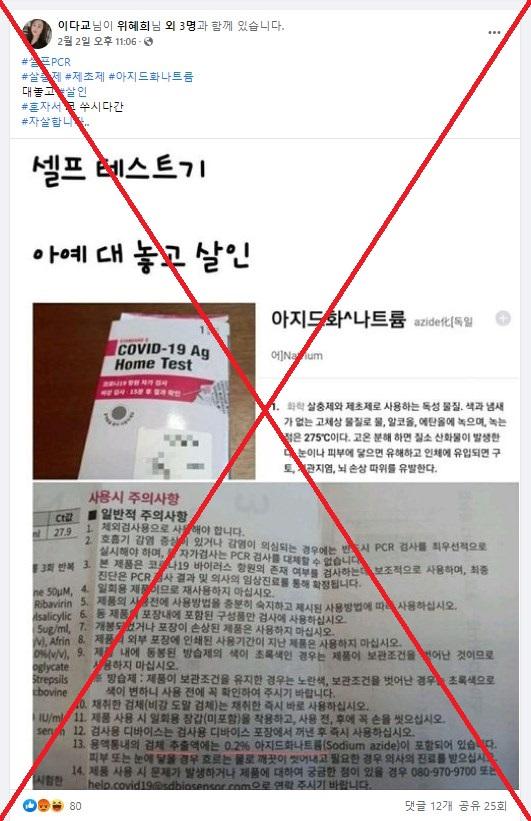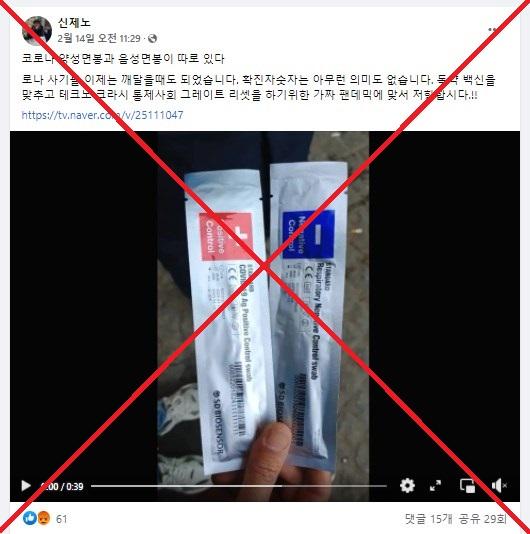
Misleading claims about Covid-19 test kits spread online in South Korea
- This article is more than four years old.
- Published on February 25, 2022 at 03:19
- 3 min read
- By SHIM Kyu-Seok, AFP South Korea
The first claim that the Covid-19 test kit contains sodium azide -- a potentially lethal chemical -- was shared alongside two images here on Facebook on February 2, 2022.
One image shows a Covid-19 test kit from South Korean diagnostics company SD Biosensor. The other shows a manual for the same kit.
The post also included a screenshot of a text post about sodium azide, which states it can "cause brain damage".

According to the US Centers for Disease Control and Prevention, sodium azide is a fast-acting substance often used as a chemical preservative or for pest control.
A similar claim was shared on Facebook here, here, here and here.
The second claim was shared here on Facebook on February 14, 2022. It was shared at least 24 times before it was deleted.
The post's Korean-language caption translates to English in part as: "Covid-19 positive and negative sample swabs are provided separately.
"It is now time to realise that Covid-19 is fake. Counting confirmed cases means nothing anymore."
The claim was shared alongside a video that shows two packages -- one is labelled as a "positive" Covid swab, while the other is labelled as Covid "negative".
In the clip, two Korean-language speakers can be heard claiming they have obtained "evidence from a friend who works in the field" which shows the "number of infections could be controlled".

A similar claim was viewed tens of thousands of times here on the South Korean streaming platform Naver TV.
The claim was also shared on Facebook here, here, here and here.
However, both claims are misleading.
Approved test kits
SD Biosensor's test kit was approved for commercial use by South Korea's Ministry for Food and Drug Safety.
A ministry spokesman said the amount of sodium azide contained in test reagents for Covid-19 test kits approved by Korea was "very minor".
"In the evaluation, we conducted prior to the approval of the product, we found no cases where the chemical came into contact with the human body or proved to be harmful," he said.
In response to the claim about sodium azide, a spokeswoman for SD Biosensor told AFP the chemical is included as a preservative in the reagent found in the kit's test tubes -- but it is not used on the swabs.
She said the chemical is commonly used by Covid-19 test kit makers, but only in "very small amounts" that are not harmful to humans.
"It is used to prevent the growth of microorganisms in the reagent, which could contaminate the results," she said.
Quality control
In response to the second claim, the SD Biosensor spokeswoman said the swabs shown in the misleading video are used to maintain quality control across all tests.
"The swabs are used by professionals to ensure the quality of the Covid-19 test kit, and not used to test patients for Covid-19," she said. "A person cannot contract or spread Covid-19 via this product."
Professor Sung Heung-sup, an expert in laboratory medicine at the Asan Medical Center in Seoul, also said the swabs were used by medical professionals for quality control.
"Before tests are carried out using these kits, professionals first use these positive and negative control swabs as substitutes for patient samples to determine if the devices are functioning properly," Sung told AFP.
AFP previously fact-checked a similar claim here about a Covid-19 testing kit manufactured by a different company.
Copyright © AFP 2017-2026. Any commercial use of this content requires a subscription. Click here to find out more.
Is there content that you would like AFP to fact-check? Get in touch.
Contact us
